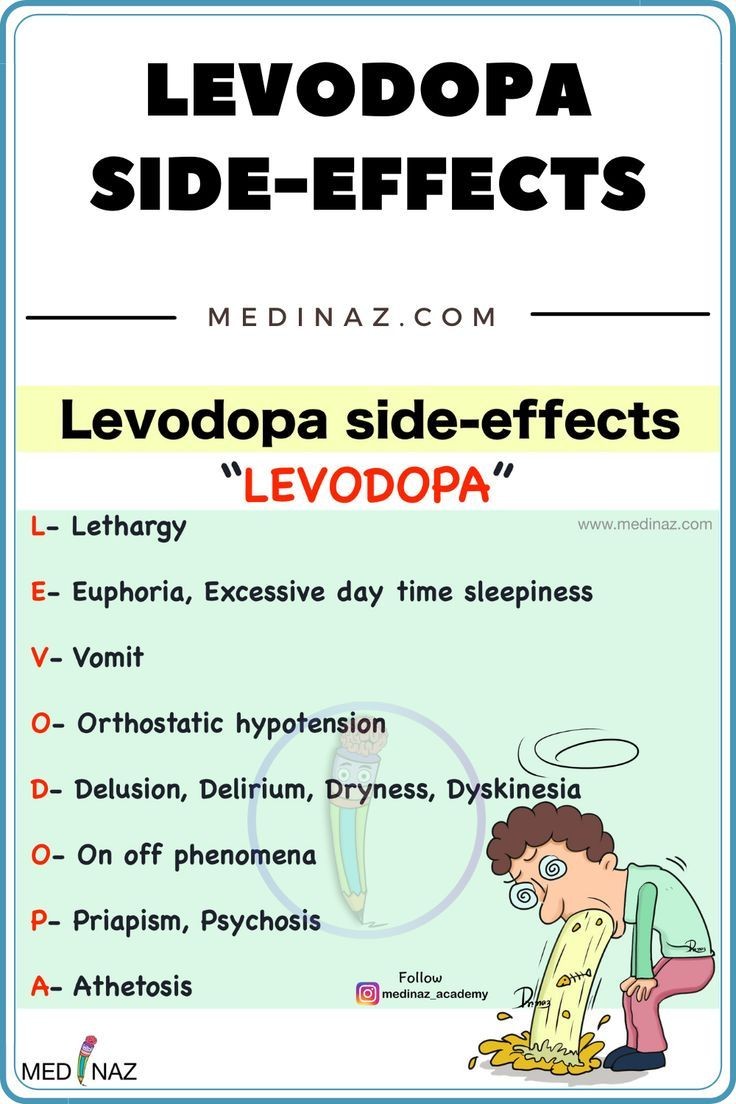
Contents
Side Effects of Sinemet (carbidopa-levodopa)
Sinemet (carbidopa-levodopa) is a combination of two drugs, levodopa and carbidopa. Carbidopa-levodopa is used to treat Parkinson’s disease.
Parkinson’s disease is thought to be caused by low dopamine levels in certain parts of the brain. When levodopa is taken orally, it crosses the "blood-brain barrier" and is converted to dopamine. This increase in dopamine concentrations in the brain is believed to improve nerve conduction and help with the movement disorders associated with Parkinson’s disease.
Carbidopa does not cross the blood-brain barrier, but it is added to levodopa to prevent its breakdown before reaching the brain. This allows for lower doses of levodopa, reducing the risk of side effects such as nausea and vomiting.
Common side effects of Sinemet include:
- gastrointestinal side effects (nausea, vomiting, loss of appetite, weight loss)
- dizziness on standing due to a drop in blood pressure
- memory loss
- anxiety
- nervousness
- agitation
- restlessness
- confusion
- inability to sleep
- nightmares
- daytime tiredness
- mental depression
- euphoria
Serious side effects of Sinemet include:
- occasional involuntary movements (muscle twitching, muscle jerks during sleep, hand tremor, chewing, twisting, tongue or mouth movements, head bobbing, movements of the feet, hands, or shoulder)
- infrequently, a drop in white blood cell counts
Drug interactions of Sinemet include amantadine, benztropine, procyclidine, and trihexyphenidyl as they can enhance the effects of levodopa in treating Parkinson’s disease.
Droperidol, haloperidol, loxapine, metoclopramide, phenothiazines, and thioxanthenes can inhibit dopamine in the brain and should not be used with levodopa.
Methyldopa and reserpine can also interfere with the effectiveness of Sinemet and increase the risk of side effects.
Using Sinemet with drugs that reduce blood pressure can increase the occurrence of postural hypotension (reduced blood pressure when standing).
Phenytoin can reduce the effectiveness of Sinemet, and using it with monoamine oxidase inhibitors antidepressants can lead to dangerous elevations in blood pressure.
Before starting carbidopa-levodopa therapy, MAOIs should be stopped 2-4 weeks in advance.
Levodopa’s side effects, such as dizziness, confusion, nausea, and hallucinations, can be increased by selegiline.
There have been no human studies on the effects of Sinemet on fetuses. The potential risks to the fetus must be weighed against the potential benefits for pregnant women prescribed Sinemet.
Levodopa is found in breast milk and may inhibit milk production, so breastfeeding women are generally advised against taking Sinemet.
Important Side Effects of Sinemet (carbidopa-levodopa)
Most patients receiving carbidopa-levodopa experience side effects, but they are usually reversible.
Gastrointestinal side effects are common and include:
- nausea
- vomiting
- loss of appetite
- weight loss
Patients may experience dizziness upon standing, which the body develops tolerance to within a few months.
Other important side effects of carbidopa-levodopa therapy include:
- memory loss
- anxiety
- nervousness
- agitation
- restlessness
- confusion
- inability to sleep
- nightmares
- daytime tiredness
- mental depression
- euphoria
Occasional involuntary movements are the most common serious side effects, including muscle twitching, muscle jerks during sleep, hand tremor, chewing, twisting, tongue or mouth movements, head bobbing, and movements of the feet, hands, or shoulder which may respond to a reduction in the dose.
Infrequently, patients may experience a drop in white blood cell count during carbidopa-levodopa therapy, which may require temporary or permanent treatment cessation.
Sinemet (carbidopa-levodopa) Side Effects for Healthcare Professionals
The most common adverse reactions reported with Sinemet include dyskinesias (choreiform, dystonic, and other involuntary movements) and nausea.
Other reported adverse reactions with Sinemet include:
Body As A Whole
Cardiovascular
Cardiac irregularities, hypotension, orthostatic effects including orthostatic hypotension, hypertension, syncope, phlebitis, palpitation.
Gastrointestinal
Dark saliva, gastrointestinal bleeding, development of duodenal ulcer, anorexia, vomiting, diarrhea, constipation, dyspepsia, dry mouth, taste alterations.
Hematologic
Agranulocytosis, hemolytic and non-hemolytic anemia, thrombocytopenia, leukopenia.
Hypersensitivity
Angioedema, urticaria, pruritus, Henoch-Schönlein purpura, bullous lesions (including pemphigus-like reactions).
Musculoskeletal
Nervous System/Psychiatric
Psychotic episodes including delusions, hallucinations, and paranoid ideation, bradykinetic episodes ("on-off" phenomenon), confusion, agitation, dizziness, somnolence, dream abnormalities including nightmares, insomnia, paresthesia, headache, depression with or without development of suicidal tendencies, dementia, pathological gambling, increased libido including hypersexuality, impulse control symptoms.
Convulsions have also occurred, but a causal relationship with Sinemet has not been established.
Respiratory
Skin
Urogenital
Laboratory Tests
Decreased hemoglobin and hematocrit; alkaline phosphatase, SGOT (AST), SGPT (ALT), LDH, bilirubin, BUN, Coombs test abnormalities; elevated serum glucose, white blood cells, bacteria, and blood in the urine.
Drug Interactions with Sinemet (carbidopa-levodopa)
Caution should be exercised when administering the following drugs concomitantly with Sinemet.
- Symptomatic postural hypotension may occur when Sinemet is added to a treatment regimen with antihypertensive drugs. Dose adjustment of the antihypertensive drug may be necessary when starting Sinemet therapy.
- Concomitant therapy with selegiline and carbidopa-levodopa may cause severe orthostatic hypotension not solely attributable to carbidopa-levodopa.
- Rare reports of adverse reactions, including hypertension and dyskinesia, have resulted from the concomitant use of tricyclic antidepressants and Sinemet.
- Dopamine D2 receptor antagonists (e.g., phenothiazines, butyrophenones, risperidone), isoniazid, phenytoin, and papaverine can reduce the therapeutic effects of levodopa in treating Parkinson’s disease. Monoamine-depleting agents (e.g., reserpine and tetrabenazine) or other drugs known to deplete monoamine stores should not be used with Sinemet.
- Iron salts or multivitamins containing iron salts should be coadministered with caution as they can reduce the bioavailability of carbidopa and levodopa.
- Metoclopramide, while increasing the bioavailability of levodopa, may also adversely affect disease control due to its dopamine receptor antagonistic properties.
Summary
Sinemet (carbidopa-levodopa) is a combination of levodopa and carbidopa used to treat Parkinson’s disease. Its common side effects include gastrointestinal issues, dizziness from low blood pressure, memory loss, anxiety, nervousness, restlessness, confusion, sleep problems, nightmares, daytime tiredness, mental depression, and euphoria. Its use during pregnancy and breastfeeding should be carefully considered. The medication can interact with various drugs, and caution should be exercised when combining it with certain substances.
NOTE: All provided HTML markup has been preserved in the revised text.


